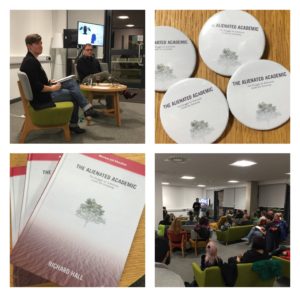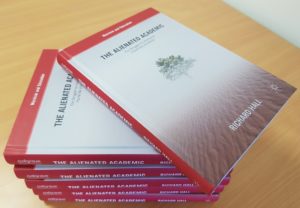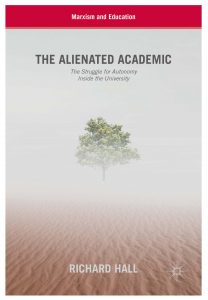Back in June I spoke at the BERA social theory and education SIG symposium about authoritarian neoliberalism and the alienation of academic labour. My focus was on authoritarian neoliberalism as a heuristic for analysing the idea of the University, and in particular knowledge production as a means of reproducing the capital-relation, and the possibility for developing alternative conceptions. These alternative conceptions erupt from an analysis of voices made marginal inside the capital-relation, including indigenous communities. This leads towards a set of spaces and histories composed by methodologies that are new and challenging and exciting to me.
This work is also new and challenging and exciting to me, because it demands an engagement with the literature around the problematic of neoliberalism, and the imposition of authoritarian modes of coercion and discipline, which are punitive on specific communities, individuals and bodies. My focus in this has tended to be on the capital-relation, picking up on the work of Simon Clarke in his neoliberal theory of society. However, my focus has also been shaped by my engagement with the Centre for Urban Research on Austerity at DMU, including its focus on governance and austerity, and resistance and mobilisation under austerity.
My conversation with participants at the BERA symposium was followed by an invitation from Justin Cruickshank at Birmingham to contribute to a forthcoming special issue for Social Epistemology: A Journal of Knowledge, Culture and Policy, on neoliberalism, higher education and technology. This was the first major thing I had written since I submitted my manuscript for The Alienated Academic, and it forced me to re-engage with the process of research and writing. It was an important step, to take a breath and refocus, and to consider how to move my thinking in a fresh direction.
I am really grateful to Justin for this invitation, because since I submitted The Alienated Academic I had been all played out. This was a function of needing to recalibrate my institutional role and repositioning myself as an academic, but also the fact that for 15 months I had been reading, researching and then intensively writing 70,000 words. In that time I had been trying to get my head around intersectional issues and narratives, the work of Hegel and Feuerbach, the eruption of literature around alienation in the 1960s and 70s, and the relationship of each of these to both Marx and academic labour. By the time I’d submitted in early May I was dreading the peer review process, partially because I was scared of what would be said about my work and partially because I simply didn’t have the energy to rewrite chapters, sections or even paragraphs.
Yet, this new work on authoritarian neoliberalism enabled me to develop some thinking about knowledge production and the use of knowledge, the role of higher education, and some emergent and naïve engagement with indigenous and aboriginal methodological approaches. It has coincided with the emergence of some new energy, for teaching, for educational practice, for my work outside the University, the podcasting, and for writing. It may be happenstance or coincidence that this invitation came at this point; but I’m grateful nonetheless.
The structure for the article is noted immediately below, and is followed by the abstract and references. I hope that the article is good enough, but I wanted to celebrate both the process and the community that supports it.
Structure
- Authoritarian neoliberalism and academic labour
- Authoritarian higher education in the global North
- An emergent appreciation of more humane knowledge
- Dismantling knowledge production in higher education
Abstract
As one response to the secular crisis of capitalism, higher education is being proletarianised. Its academics and students, increasingly encumbered by precarious employment, debt, and new levels of performance management, are shorn of autonomy beyond the sale of their labour-power. One heuristic for analysing this response is authoritarian neoliberalism, imposed as a means of enacting disciplinary practices in the name of the market with an anti-democratic rationale. This has a distinctly technocratic focus, rooted in techniques of performativity, including audits and assessments of teaching, research and scholarship, grounded in productivity, the management of time and value-creation. However, there are a range of intersectional and geographical responses to such an imposition, through which it is possible to describe alternatives to these architectures of subsumption. In particular, a second heuristic emerges which challenges the restructuring of the University in the global North, erupting from struggles for decolonisation. Here, Audre Lorde’s invocation to an integrated, poetic existence that situates bodies in places, and respects feelings and emotions as the site of epistemological development and understanding, underpins the possibility for dismantling hegemonic knowledge production. The article examines whether humanist narratives of solidarity, in particular from marginalised voices, might help academics and students to analyse their alienated labour and to imagine that another world is possible.
References
Ahmed, S. 2012. On Being Included: Racism and Diversity in Institutional Life. Durham, NC: Duke University Press.
Ahmed, S. 2017. Living a Feminist Life. Durham, NC: Duke University Press.
Amsler, M. 2017. “Responsibilisation and leadership in the neoliberal university: a New Zealand perspective.” Discourse: Studies in the Cultural Politics of Education 38 (1): 123-37.
Andrews, K. 2018. Back to Black: Retelling Black Radicalism for the Twenty-First Century. London: Zed Books.
Arvin, M., E. Tuck, and A. Morrill. 2013. “Decolonising feminism: Challenging connection between settler colonialism and heteropatriarchy.” Feminist Formations, 25 (1): 8-34.
Azar, R. 2015. “Neoliberalism, Austerity, and Authoritarianism.” New Politics XV (3).
Aztlán, A. 2017. “Trumpism, Authoritarian Neoliberalism, and Subaltern Latina/o Politics.” Journal of Chicano Studies 42 (2): 147-64.
Ball, S. 2012. Global Education Inc. New Policy Networks and the Neoliberal Imaginary. London: Routledge.
Barnett, R. 2016. Understanding the University: Institution, Idea, Possibilities. London: Routledge.
Bhambra, G. 2017. “Brexit, Trump, and ‘methodological whiteness’: on the misrecognition of race and class.” The British Journal of Sociology. 68 (1): 214-32.
Bhambra, G., D. Gebrial, and K. Nisancioglu, eds 2018. Decolonising the University. London: Pluto Press.
Bruff, I. 2012. “Authoritarian neoliberalism, the Occupy movements, and IPE.” Journal of Critical Globalisation Studies 1 (5): 114-16.
Bruff, I. 2014. “The Rise of Authoritarian Neoliberalism.” Rethinking Marxism: A Journal of Economics, Culture & Society 26(1): 113-29. doi.org/10.1080/08935696.2013.843250
Bruff, I., and C.B. Tansel. 2018. “Authoritarian neoliberalism: trajectories of knowledge production and praxis.” Globalizations. 10.1080/14747731.2018.1502497
Canaan, J. 2017. “The (Im)possibility of Mass Intellectuality: Viewing Mass Intellectuality Through the Lens of the Brazilian Landless Movement.” In Mass Intellectuality and Democratic Leadership in Higher Education, edited by R. Hall and J. Winn, 69-80. London: Bloomsbury Academic.
CASA. (n.d). A home online for casual, adjunct, sessional staff and their allies in Australian higher education. http://actualcasuals.wordpress.com/
Connell, R. 2013. “The neoliberal cascade and education: an essay on the market agenda and its consequences.” Critical Studies in Education 54 (2): 99-112. 10.1080/17508487.2013.776990
Davies, W. 2016. “The New Neoliberalism.” New Left Review, 101. https://newleftreview.org/II/101/william-davies-the-new-neoliberalism
Davies, W. 2017. “Elite Power under Advanced Neoliberalism.” Theory, Culture & Society 34 (5-6): 227 – 50. 10.1177/0263276417715072
DBIS. 2015. The Small Business, Enterprise and Employment Act. London: HM Stationery Office. http://www.legislation.gov.uk/ukpga/2015/26/pdfs/ukpga_20150026_en.pdf
de Sousa Santos, B., ed. 2007. Cognitive Justice in a Global World: Prudent Knowledges for a Decent Life. New York: Lexington Books.
DET. 2016. National Strategy for International Education 2025. https://internationaleducation.gov.au/International-network/Australia/InternationalStrategy/Pages/National-Strategy.aspx
DfE. 2017. The Higher Education and Research Act. London: HM Stationery Office. http://www.legislation.gov.uk/ukpga/2017/29/pdfs/ukpga_20170029_en.pdf
Dinerstein, A. 2015. The Politics of Autonomy in Latin America: The Art of Organising Hope. London: Palgrave Macmillan.
Hall, R. 2015. “The University and the Secular Crisis.” Open Library of Humanities 1 (1): p.e6. 10.16995/olh.15.
Hall, R. 2018. The Alienated Academic: The Struggle for Autonomy Inside the University. London: Palgrave Macmillan.
Hall, R. and J. Winn, eds 2017. Mass Intellectuality and Democratic Leadership in Higher Education. London: Bloomsbury Academic.
Harris, K, A. Schwedel, and A. Kim. 2012. A world awash in money. http://www.bain.com/publications/articles/a-world-awash-in-money.aspx
Hillman, N. 2016. “The Coalition’s higher education reforms in England.” The Oxford Review of Education 42 (3): 330–45. 10.1080/03054985.2016.1184870
HM Treasury. 2015. Fixing the foundations: Creating a more prosperous nation. London: HM Treasury. https://www.gov.uk/government/uploads/system/uploads/attachment_data/file/443898/Productivity_Plan_web.pdf
King, T. 2003. The truth about stories: a native narrative. Toronto: House of Anansi Press Inc.
Lorde, A. 2013. The master’s tools will never dismantle the master’s house. London: Penguin.
Marginson, S. 2016. Higher Education and the Common Good. Melbourne, Australia: Melbourne University Press.
Marx, K., and F. Engels. 2002. The Communist Manifesto. London: Penguin.
McGettigan, A. 2015. “The Treasury View of HE: Variable Human Capital Investment.” Political Economy Research Centre Papers Series 6. www.perc.org.uk/perc/wp-content/uploads/2015/04/PERC-6-McGettigan-and-HE-and-Human-Capital-FINAL-1.pdf.
Moten, F., and S. Harney. 2013. The Undercommons: Fugitive Planning & Black Study. Brooklyn: Minor Compositions.
Motta, S. 2018. Liminal Subjects: Weaving (Our) Liberation. London: Rowman & Littlefield International.
Newfield, C. 2016. The Great Mistake: How We Wrecked Public Universities and How We Can Fix Them. Baltimore: Johns Hopkins University Press.
Newman, J. 2012. Working the Spaces of Power: Activism, Neoliberalism and Gendered Labour. London: Bloomsbury.
O’Dwyer, S., S. Pinto, and S. McDonagh. 2017. “Self-care for academics: a poetic invitation to reflect and resist.” Reflective Practice 19 (2): 243-49. OECD 2018. Public Financial Management: An overview. http://www.oecd.org/dac/effectiveness/pfm.htm
Pasquale, F. 2016. “Two Narratives of Platform Capitalism.” Yale Law and Policy Review 309. https://ylpr.yale.edu/two-narratives-platform-capitalism.
Pasquale, F. 2018. “Tech Platforms and the Knowledge Problem.” American Affairs II (2). https://americanaffairsjournal.org/2018/05/tech-platforms-and-the-knowledge-problem/.
Roberts, M. 2018. The Long Depression: How it Happened, why it Happened, and what Happens Next. London: Haymarket Books.
Steinþórsdóttir, F.S, T.M. Heijstra, and P.J. Einarsdóttir. 2017. “The making of the ‘excellent’ university: A drawback for gender equality.” ephemera: theory and politics in organization 17 (3): 557-82.
Styres, S. 2018. Literacies of Land: Decolonising Narratives, Storytelling, and Literature. In Indigenous and Decolonizing Studies in Education: Mapping the Long View, edited by L. Tuhiwai Smith, E. Tuck, and K.W. Yang, 24-33. London: Routledge.
Tansel, C.B. ed., 2017. States of discipline: Authoritarian neoliberalism and the contested reproduction of capitalist order. London: Rowman & Littlefield International.
Tuck, E., and K.W. Yang. 2012. “Decolonization is not a metaphor.” Decolonization: Indigeneity, Education and Society 1(1): 1-40.
Tuhiwai Smith, L., E. Tuck, and K.W. Yang eds 2018. Indigenous and Decolonizing Studies in Education: Mapping the Long View. London: Routledge.
Wilson, S. 2008. Research as ceremony: Indigenous research methods. Blackpoint: Fernwood Publishing.


